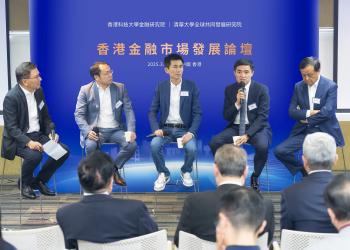News & Stories
2025
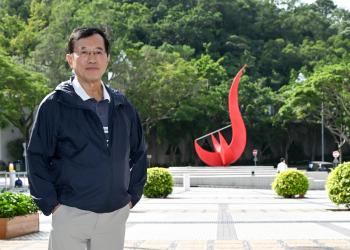
Stories
Igniting Innovation and Entrepreneurship
Academic-entrepreneur Professor KO Ping-Keung came to HKUST in 1993 as Visiting Professor in the Department of Electronic and Computer Engineering after working at the University of California, Berkeley, as Director of the Microfabrication Laboratory from 1984-1993, and Vice-Chairman of the Department of Electrical Engineering and Computer Sciences from 1991-1993. He served as Dean of the HKUST School of Engineering from 1995-2000 and in 2002 received the prestigious IEEE Solid-State Circuits Award. He has since become an innovator and angel investor in China’s chip industry and is a Professor Emeritus at HKUST. In 2024, Prof. Ko was awarded a HKUST Honorary Fellowship in recognition of his long-standing service and commitment to the University’s development.
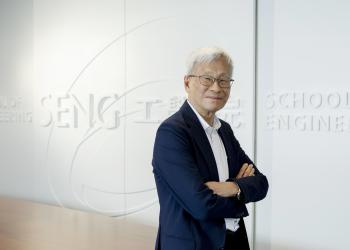
Stories
Opportunity of a Lifetime I Couldn’t Miss
Prof. Philip CHAN Ching-Ho joined the School of Engineering in 1991 as a founding member. He served as Head of the School of Engineering’s Electrical and Electronic Engineering Department from 1995-2002 and Dean of the School from 2003-09. He was Director of the Nanosystem Fabrication Facility from 1997-2003. From 2010-20, he held the positions of Deputy President and Provost at Hong Kong Polytechnic University. He became Professor Emeritus in HKUST’s Department of Electronic and Computer Engineering in 2010.
2024
Stories
From Quips to Chips: Dr. Jensen Huang Spots the World of AI
New technology, like artificial intelligence (AI), has shaken the world. Chances are the insights from today’s great minds will steer us towards a right path.The Hong Kong University of Science and Technology (HKUST) conferred an Honorary Doctor of Engineering honoris causa on Dr. Jensen HUANG, the founder and CEO of NVIDIA. As a newly welcomed member of the HKUST community, he joined Prof. Harry SHUM, Council Chairman of HKUST and a celebrated computer scientist, for a fireside chat on November 23, 2024. Together, the technological experts explored critical issues surrounding “Technology, Leadership, and Entrepreneurship”.The hundreds of participants in the auditorium were mesmerized, not just by the speakers’ stylish leather jackets emblazoned with “HKUST”, but also by Dr. Huang’s dynamic presence and the wise words from the two experts on stage.

Stories
A Confluence of Minds and Molecules
Ever wondered what molecules are and why they matter? Picture this: while you reflect on this question, molecules are dancing in your brain, subtly shaping your thoughts and emotions. These tiny building blocks of life hold the key to solving some of humanity’s greatest challenges.The recent Molecular Frontiers Symposium at the Hong Kong University of Science and Technology (HKUST) was a remarkable occasion to ignite curiosity about molecular science. Taking place in the Greater China for the first time from November 15-17, 2024, with the theme “Frontiers of New Knowledge in Science,” the symposium featured an impressive lineup of nearly 40 speakers, including four Nobel laureates Professor Stefan HELL, Sir Tim HUNT, Professor K. Barry SHARPLESS and Sir Gregory WINTER.
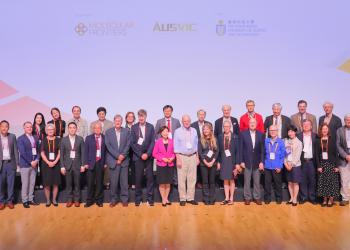
News
HKUST Welcomes Four Nobel Laureates at the Molecular Frontiers Symposium Sparking Passion for Science and Innovation Among Young Minds
The Hong Kong University of Science and Technology (HKUST) is excited to kick off a prestigious three-day “Molecular Frontiers Symposium” at Shaw Auditorium on campus today. The high-level event showcases a lineup of internationally renowned scientists including four Nobel laureates, serving as a dynamic thought-leadership platform for exchanging ideas among brilliant and young minds.
Around 40 leading molecular scientists, including Nobel laureates Prof. Stefan HELL, Sir Tim HUNT, Prof. K. Barry SHARPLESS, and Sir Gregory WINTER, will share their knowledge and insights spanning the latest development in genome editing, fluorescence microscopy and protein engineering in this inaugural symposium in Greater China entitled "Frontiers of New Knowledge in Science".
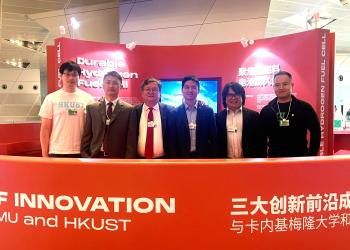
Stories
HKUST Cohort Inspires Awe with Game-changing Innovations at WEF Summer Davos 2024
AI technologies are poised to become more humanized in the art scene, according to Professor GUO Yike, HKUST Provost and world-renowned scholar on Artificial Intelligence (AI) and machine learning, who shared his thought leadership on the interplay of Generative AI and art at the World Economic Forum (WEF) Summer Davos 2024. Joining Professor Guo at the global event were Professor SHAO Minhua, Head and Chair Professor, Department of Chemical and Biological Engineering, and Professor FAN Zhiyong, Chair Professor, Department of Electronic and Computer Engineering — both of whom showcased innovations at this prestigious event— while Professor HUI Pan, Chair Professor of Computational Media and Arts of HKUST (GZ), participated as a member of Global Future Council on the Future of Metaverse.
2023
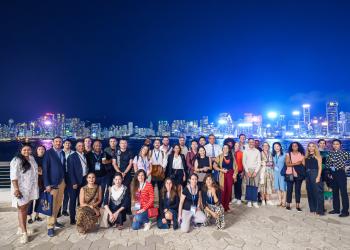
News
HKUST’s First Leadership Development Program with the World Economic Forum in Greater China Concludes (Chinese version only)
香港科技大學(科大)與世界經濟論壇合作,於上周接待了40位來自包括歐洲、北美洲、拉丁美洲、非洲和中東等22個國家及地區,專業領域涵蓋法律、科技、媒體、公共行政、投資銀行和人道援助等領域的年輕管理人員和公司創辦人,成為大中華區首間舉辦「全球青年領袖論壇領導力發展課程」的大學。科大校董會主席沈向洋教授、校長葉玉如教授、首席副校長郭毅可教授、副校長(大學拓展)汪揚教授以及科大其他教授,均就其各自專業於課程活動中分享及講授與人工智能(AI)相關的話題。
葉玉如教授在歡迎午宴中表示科大在人工智能的開發和應用均走在前沿。大學致力參與尖端人工智能研究,並開發先驅性技術。是次課程除邀得科大頂級學者,就AI最新發展及該技術對環球經濟和社會的影響授課,亦邀請了香港大學和香港教育大學的世界級學者講授課程。大學亦響應「香港夜繽紛」,安排學員參觀尖沙咀海濱等景點,體驗香港國際大都會氣氛,又帶同學員走訪香港與內地的初創企業和科技巨頭,促進來自世界各地的課程參與者與大灣區創業者、研究員與投資者之間的交流。參與是次課程的青年領袖來自不同背景,包括巴西政黨、貝克麥堅時律師事務所、美國有線新聞網絡和里約熱內盧州檢察官辦公室等。
多國大學如哈佛、普林斯頓、劍橋和牛津等,均曾與世界經濟論壇合作舉辦「全球青年領袖論壇領導力發展課程」,探討包括能源創新和可持續發展等全球重要議題。









